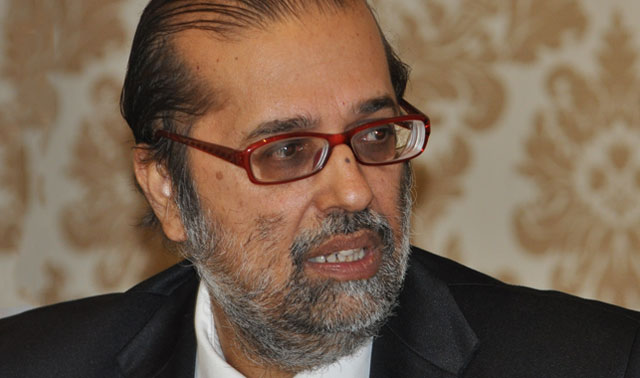 It is unfortunate that, in his rush to push through a new framework for digital migration of South African television, communications minister Yunus Carrim has resorted to rewriting history, distorting facts and again pretended that the views of the black electronics sector do not matter.
It is unfortunate that, in his rush to push through a new framework for digital migration of South African television, communications minister Yunus Carrim has resorted to rewriting history, distorting facts and again pretended that the views of the black electronics sector do not matter.
The latest evidence of this is a column by Carrim’s spokesman, Siya Qoza, and published by TechCentral. The piece contains a string of inaccuracies — all in an attempt to justify the minister’s preference for an “encrypted” digital migration model that has no merit and that will punish the emerging South African electronics industry, the local film industry and community broadcasters.
We feel compelled to respond to Qoza’s column, but we believe that rather than rely on the perception of a spin doctor who is trying to protect the reputation of his employer, we should rather look at the facts.
Carrim can insult us, try to deny us our voice and try to lock us out of future business, but he cannot ignore history, or the truth about encrypted digital migration.
First, some history.
A multi-stakeholder workshop was held on 16 April 2013 to discuss whether or not encrypted set-top boxes were the best option for South Africa.
That workshop took a resolution that the requirement for set-top box control/encryption should be scrapped from government policy in its entirety.
The resolution was signed by Namec, the MK Military Veterans’ Association, the Progressive Women’s Movement of South Africa, the Congress of Traditional Leaders (Contralesa), the South African National Civic Organisation, the Black Business Council and many other organisations.
This resolution was submitted to the minister and to the department of communications, and in her budget vote of 21 May 2013, the former minister, Dina Pule, said: “We have taken a decision to review the policy on the set-top box control system as one way of fast-tracking the roll-out of digital terrestrial television to make this system non-mandatory.”
However, when Carrim was appointed shortly thereafter, he embarked on a process that completely disregarded all that had been pronounced upon by government in the past — and decided to bring back set-top box control/encryption in the draft policy.
It is incorrect, therefore, for the minister now to pretend that he is merely implementing a cabinet decision from 2008. By doing this, Carrim is trying to make the entire cabinet culpable for a decision, which he alone has taken.
Secondly, there is a claim that his policy choice is simply giving meaning to a resolution that was taken at the ANC’s Mangaung conference in Bloemfontein in 2012.
The resolution in question, in fact, sets out the need for government to encourage competition in the broadcasting sector.
Nowhere does it say that the government has to subsidise private entities that want to enter the pay-TV industry, which is effectively what will happen if Carrim has his way.
Nor does it say that the option chosen by government should punish local black industry.
We are deeply disappointed at this deliberate attempt to distort the resolutions taken by mandated representatives of the ruling party.
Thirdly, the ministry tries to create the impression that the favoured policy choice is not in fact encryption, but is some innocuous “generic control”.
The truth is that the department’s own policy states clearly that, to avoid broadcasters benefiting unfairly from the set-top box control system, government’s investment in the control system will be recovered from those subscription broadcasters that choose to make use it.
This statement clearly indicates that the envisaged set-top box control is nothing other than a control system that pay-TV operators use — and all pay-TV operators use encryption.
It is therefore a blatant misrepresentation by Qoza to spin government’s policy proposal as some form of generic solution, and not encryption, when it clearly is.
Fourthly, the minister’s spokesman tries to create the impression of a trend towards encryption in digital migration in other parts of Africa, in particular in Tanzania, Namibia and Malawi.
The truth is that in Tanzania, the regulatory authority has mandated a common interface slot in its specification and has not mandated control/encryption in all set-top boxes. Broadcasters, which have pay-TV ambitions, have deployed their own set-top boxes, at their own cost, and which have their own encryption system. They have certainly not benefited from any government subsidies.
In Namibia, the broadcasting regulator published its specifications in a government gazette dated 6 December 2013 rejecting the inclusion of encryption, and it specifically states in the specification section: “No conditional access module to be embedded.”
Malawi has so far not pronounced anything with regard to set-top box control/encryption.
It is therefore again a misrepresentation and dishonesty to claim that these countries have adopted the same option that is being put forward by the minister.
There are a range of other issues in Qoza’s piece that are incorrect – such as the claim that the local black-owned electronics industry will not be negatively affected by encryption, or that we are “pursuing narrow business interests”. We reject these claims – they are insulting, they bear no resemblance to the truth, and are a conscious attempt to mislead the public.

Which bring us to a broader issue, of deep concern to the organisation I represent and to a growing number of other stakeholders.
Throughout this debate, we have kept asking ourselves why Carrim insists on encryption when it is clear it is unnecessary. What is at stake?
We believe the reasons for his support are becoming clearer, particularly in light of the growing allegations of impropriety in the department of communications in recent weeks, as well as associated investigations by law enforcement agencies.
So, while we would not want to add to the long list of burdens Carrim is grappling with, we would encourage him urgently to consider the following:
- It is a matter of record that there are government officials among those who submitted proposals for the last round of requests for proposals (RFPs) for set-top boxes, in 2012.
- Those same officials will no doubt want to respond to the next round of RFPs — so they clearly have a vested interest in the final specifications that are chosen by government now, before the minister’s term ends.
- It would be very easy for these officials to want to influence the final policy decision, in whatever underhanded way, so that it favours their chances when the specifications are finally issued.
Perhaps this is why they are pushing the minister so hard, and advising him so firmly, on one particular system of encryption.
- Keith Thabo is president of the National Association of Manufacturers in Electronic Components




